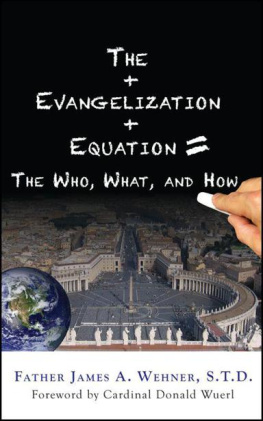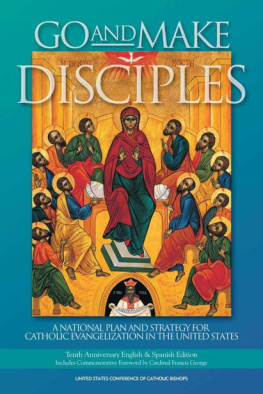DISCIPLES CALLED TO WITNESS
THE NEW EVANGELIZATION
But you will receive power when the holy Spirit comes upon you, and you will be my witnesses... to the ends of the earth.
Acts 1:8
COMMITTEE ON EVANGELIZATION AND CATECHESIS
UNITED STATES CONFERENCE OF CATHOLIC BISHOPS
WASHINGTON, DC
TABLE OF CONTENTS
PREFACE
But you will receive power when the holy Spirit comes upon you, and you will be my witnesses in Jerusalem, throughout Judea and Samaria, and to the ends of the earth. When he had said this, as they were looking on, he was lifted up, and a cloud took him from their sight. While they were looking intently at the sky as he was going, suddenly two men dressed in white garments stood beside them. They said, Men of Galilee, why are you standing there looking at the sky?
Acts 1:8-11
C hrist commands us to be his witnesses to the ends of the earth. We are to proclaim his Good News to all people, everywhere and at all times. After Christ promises the disciples that the Holy Spirit will come upon them, he ascends into heaven. The disciples, rather than heeding Christs command to be his witnesses, stare intently at the sky. It takes two men dressed in white garments asking, Men of Galilee, why are you... looking at the sky? for the disciples to begin to realize the meaning of Christs command (Acts 1:10-11).
How often do we fail to realize that we are called to be Christs witnesses to the world? Do we realize that our Baptism, Confirmation, and reception of the Eucharist bestow on us the grace we need to be disciples? Are we like the disciples staring at the sky rather than inviting those around us to experience Christs love and mercy through the Church? How often do we reach out to our missing brothers and sisters by inviting them to join us at Mass or by asking why they no longer feel welcomed at the Lords Table? The answers to these questions underlie the evangelizing mission of the Church, especially in the call of the New Evangelization.
The New Evangelization seeks to invite modern man and culture into a relationship with Jesus Christ and his Church. The New Evangelization strives to engage our culture and to help us draw our inspiration from the Gospel. The New Evangelization calls all Catholics first to be evangelized and then in turn to evangelize. While it is directed to all people, the New Evangelization focuses specifically on those Christian communities that have Catholic roots but have lost a living sense of the faith, or even no longer consider themselves members of the Church.
The Committee on Evangelization and Catechesis seeks to take up the call of the New Evangelization with this resource. Diocesan bishops, eparchs, pastors, diocesan and parish staff, and indeed all Catholics will find this resource helpful in the creation of outreach efforts aimed at inviting and welcoming Catholics back to the Lords Table. This resource discusses
- The call of the New Evangelization within our cultural context ()
- The theological foundations of the New Evangelization ()
- The importance of evangelization and personal conversion, or metanoia ()
- Ideas on how to create a culture of witness ()
- Key Components of outreach programs for diocesan and parish-based evangelization programs ()
PART I
CURRENT CULTURAL CONTEXT
While he was still a long way off, his father caught sight of him, and was filled with compassion. He ran to his son, embraced him and kissed him.
Lk 15:20
The Ministry of Jesus
Christ calls all people to himself. Throughout his public ministry, the Lord Jesus welcomed the stranger, How do we, today, follow the call and summons of Jesus to seek out the stranger, heal the sick, and welcome the weary? Jesus, in and through his Church, wants us to experience the urgent vigilance of the father of the prodigal son so that as we anxiously await the return of missing family and friends, we will be ready to run to greet and embrace them.
Our Current Situation
Today, through the ministry of the Church, Jesus continues to call all people to himself. It is estimated that only 23 percent of U.S. Catholics attend Mass each week. In other words, many of our brothers and sisters have simply drifted away from the Church. This is due in part to the busyness of modern life and to a changing culture. There are also Catholics who attend Mass on a regular basis but who feel unconnected to the parish community. The reasons for not attending Mass highlighted in CARAs study also point to an increased secularization, materialism, and individualism.
Secularism influences all aspects of society, claiming religion is merely a private matter. Pope Benedict XVI has cautioned, Any tendency to treat religion as a private matter must be resisted. Only when their faith permeates every aspect of their lives do Christians become truly open to the transforming power of the Gospel. Our personal relationship with Christ does not hinder our participation in the community of believersthe Church.
In addition, there is an unsettling ignorance of the Eucharist as well as an erosion of Sunday as the Lords Day dedicated to prayer and rest. The reasons that Catholics cite for missing Mass can be met and overcome by parishes that foster a welcoming environment for adolescents, young adults, singles, married couples, parents, families, the sick or disabled, and anyone who is no longer active in the faith. The means for fostering a welcoming environment is the New Evangelization. The New Evangelization places a special emphasis on welcoming back to the Lords Table all those who are absent, because they are greatly missed and needed to build up the Body of Christ.
The New Evangelization
The New Evangelization is a call to each person to deepen his or her own faith, have confidence in the Gospel, and possess a willingness to share the Gospel. It is a personal encounter with the person of Jesus, which brings peace and joy. The New Evangelization provides the lens through which people experience the Church and world around them.
The New Evangelization invites people to experience Gods love and mercy through the sacraments, especially through the Eucharist and Penance and Reconciliation. Evangelization is the essence of the Churchs identity: The Church on earth is by its very nature missionary since, according to the plan of the Father, it has its origin in the mission of the Son and the holy Spirit.
Positive Developments
Dioceses and parishes have already responded to the call of the New Evangelization by creating evangelization formation programs. This formation helps prepare parish leaders to initiate catechetical and reconciliation initiatives, which are meant to invite back to the faith and welcome our brothers and sisters who have been away. Sources of hope in the Church include diocesan and parish efforts to continually strengthen high schoollevel catechetical programs and to re-energize youth ministry programs and young adult ministries so as to reach these populations before they stop practicing the faith. Currently, dioceses focus their efforts on marriage preparation programs for young couples discerning marriage and on programs for couples becoming new parents. Diocesan and parish leaders also make an effort to welcome immigrants and attend to the needs of diverse groups. Opportunities to live the Gospel through concrete action, and thus to transform our culture, are numerous through advocacy and social justice ministries. Direct service opportunities frequently bring people back to the faith; this is especially true of young adults who value service projects. Many parishes offer not only Masses but also religious education, formation programs, and other pastoral services for cultural groups in their native languages. Additionally, new ecclesial movements and communities are flourishing, and they are eager to join dioceses and parishes in evangelization efforts.








